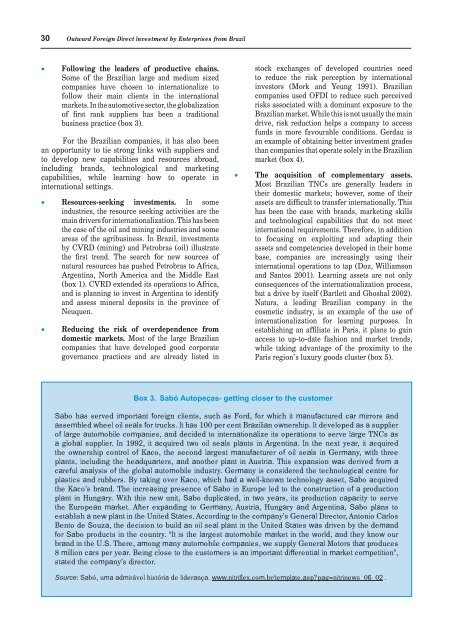Global Players from Emerging Markets: Strengthening ... - Unctad
Global Players from Emerging Markets: Strengthening ... - Unctad
Global Players from Emerging Markets: Strengthening ... - Unctad
You also want an ePaper? Increase the reach of your titles
YUMPU automatically turns print PDFs into web optimized ePapers that Google loves.
30 Outward Foreign Direct Investment by Enterprises <strong>from</strong> Brazil<br />
• Following the leaders of productive chains.<br />
Some of the Brazilian large and medium sized<br />
companies have chosen to internationalize to<br />
follow their main clients in the international<br />
markets. In the automotive sector, the globalization<br />
of first rank suppliers has been a traditional<br />
business practice (box 3).<br />
For the Brazilian companies, it has also been<br />
an opportunity to tie strong links with suppliers and<br />
to develop new capabilities and resources abroad,<br />
including brands, technological and marketing<br />
capabilities, while learning how to operate in<br />
international settings.<br />
• Resources-seeking investments. In some<br />
industries, the resource seeking activities are the<br />
main drivers for internationalization. This has been<br />
the case of the oil and mining industries and some<br />
areas of the agribusiness. In Brazil, investments<br />
by CVRD (mining) and Petrobras (oil) illustrate<br />
the first trend. The search for new sources of<br />
natural resources has pushed Petrobras to Africa,<br />
Argentina, North America and the Middle East<br />
(box 1). CVRD extended its operations to Africa,<br />
and is planning to invest in Argentina to identify<br />
and assess mineral deposits in the province of<br />
Neuquen.<br />
• Reducing the risk of overdependence <strong>from</strong><br />
domestic markets. Most of the large Brazilian<br />
companies that have developed good corporate<br />
governance practices and are already listed in<br />
stock exchanges of developed countries need<br />
to reduce the risk perception by international<br />
investors (Mork and Yeung 1991). Brazilian<br />
companies used OFDI to reduce such perceived<br />
risks associated with a dominant exposure to the<br />
Brazilian market. While this is not usually the main<br />
drive, risk reduction helps a company to access<br />
funds in more favourable conditions. Gerdau is<br />
an example of obtaining better investment grades<br />
than companies that operate solely in the Brazilian<br />
market (box 4).<br />
• The acquisition of complementary assets.<br />
Most Brazilian TNCs are generally leaders in<br />
their domestic markets; however, some of their<br />
assets are difficult to transfer internationally. This<br />
has been the case with brands, marketing skills<br />
and technological capabilities that do not meet<br />
international requirements. Therefore, in addition<br />
to focusing on exploiting and adapting their<br />
assets and competencies developed in their home<br />
base, companies are increasingly using their<br />
international operations to tap (Doz, Williamson<br />
and Santos 2001). Learning assets are not only<br />
consequences of the internationalization process,<br />
but a drive by itself (Bartlett and Ghoshal 2002).<br />
Natura, a leading Brazilian company in the<br />
cosmetic industry, is an example of the use of<br />
internationalization for learning purposes. In<br />
establishing an affiliate in Paris, it plans to gain<br />
access to up-to-date fashion and market trends,<br />
while taking advantage of the proximity to the<br />
Paris region’s luxury goods cluster (box 5).<br />
Box 3. Sabó Autopeças- getting closer to the customer<br />
Sabo has served important foreign clients, such as Ford, for which it manufactured car mirrors and<br />
assembled wheel oil seals for trucks. It has 100 per cent Brazilian ownership. It developed as a supplier<br />
of large automobile companies, and decided to internationalize its operations to serve large TNCs as<br />
a global supplier. In 1992, it acquired two oil seals plants in Argentina. In the next year, it acquired<br />
the ownership control of Kaco, the second largest manufacturer of oil seals in Germany, with three<br />
plants, including the headquarters, and another plant in Austria. This expansion was derived <strong>from</strong> a<br />
careful analysis of the global automobile industry. Germany is considered the technological centre for<br />
plastics and rubbers. By taking over Kaco, which had a well-known technology asset, Sabo acquired<br />
the Kaco’s brand. The increasing presence of Sabo in Europe led to the construction of a production<br />
plant in Hungary. With this new unit, Sabo duplicated, in two years, its production capacity to serve<br />
the European market. After expanding to Germany, Austria, Hungary and Argentina, Sabo plans to<br />
establish a new plant in the United States. According to the company’s General Director, Antonio Carlos<br />
Bento de Souza, the decision to build an oil seal plant in the United States was driven by the demand<br />
for Sabo products in the country. “It is the largest automobile market in the world, and they know our<br />
brand in the U.S. There, among many automobile companies, we supply General Motors that produces<br />
8 million cars per year. Being close to the customers is an important differential in market competition”,<br />
stated the company’s director.<br />
Source: Sabó, uma admirável história de liderança. www.nitriflex.com.br/template.asp?pag=nitrinews_06_02 .

















